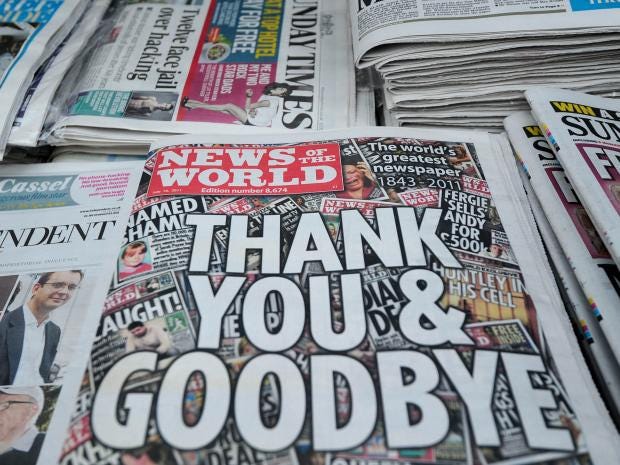1) Create a blogpost where you make notes from the article under the following headings:
- examples
- theory (audience reception etc.)
- benefits to institutions
- benefits to audience
- wider issues and debates
- SHEP
2) What is meant by the term ‘citizen journalist’?
3) What was one of the first examples of news being generated by ‘ordinary people’?
4) List some of the formats for participation that are now offered by news organizations.
5) What is one of the main differences between professionally shot footage and that taken first-hand (UGC)?
6) What is a gatekeeper?
7) How has the role of a gatekeeper changed?
8) What is one of the primary concerns held by journalists over the rise of UGC?
9) Offer your own opinion (critical autonomy) on the following:
What impact is new/digital media having on:
- news stories
- the news agenda (the choice of stories that make up the news)
- the role of professionals in news
1) Examples
- High-speed chase by police to catch Rodney King, an African-American who was eventually surrounded, tasered and beat with clubs all filmed by onlooker from apartment window. Made prime time news internationally, it was a focus for complaints about police racism towards African Americans. RESULT : 4 COPS WERE CHARGED WITH ASSAULT AND USE OF EXCESSIVE FORCE BUT WERE LATER ACQUITTED OF CHARGES SPARKING HUGE CIVIL UNREST .
- London Bombings - July 2005
- Asian Tsunami - 26th December 2004
- Mumbai, India: Bombings - late November 2008
- Hudson River Plane Crash - 15th January 2009
- Seung-Hui Cho - Undergraduate 23-year-old who regularly sent photos, written pieces and videos to NBC news
As a result, of these first-hand accounts the reaction they got had everyone springing into action and looking into what had just broken.
Theory (audience reception etc.)
- Crowd Sourcing - Eventually leaving the media unmediated
Benefits to institutions
- They are buying into the world of UGC - Buying up social networking sites. e.g) News Corp brought Myspace.
Benefits to audience
- First-hand accounts
- Less censored
- No longer passive receivers of news
- Can access the news from wherever they are
Wider issues and debates
- The riots that followed the acquittal, killed and injured many was it really necessary to prove a point?
- Would the four police officers even have been charged in the first place, if it wasn't for onlooker George Holliday grabbing his video camera? - " King's beating would be just another hidden incident with no consequences" - Sara Mills (Article writer)
SHEP
- Social: Greater accessibility - Shareable through the internet on sites such as Twitter, Myspace, YouTube and Facebook
- Historical: Audience were passive receivers of news in the past, with news being only produced by big news conglomerates. Now... we are creators and receivers
- Economical: Big organisations are suffering with the rise of UGC, Less profit for large organisations. e.g. Nobody is buying printed newspapers anymore. News companies have needed to become more inventive with the way in which they make their profit. e.g. advertising.
- Political: What is going to happen to the media if eventually it is a unmediated world? How are we going to know what to believe and what not to believe?
2) What is meant by the term ‘citizen journalist’?
The term citizen journalist refers to regular people like you and me who over the years have had greater access to filming capabilities through our phones and other devices which has allowed us to play an active role in the creation of news. We can rapidly collect and distribute footage we collect via the internet for all to see which then gets shared and can end up becoming a viral news story, just the story of Rodney King.
3) What was one of the first examples of news being generated by ‘ordinary people’?
The case of Rodney King, that was captured and shared by an ordinary person in a matter of minutes and before long went viral with all the major news conglomerates in a wide variety of countries broadcasting the news about Rodney King and the police brutality towards him.
4) List some of the formats for participation that are now offered by news organisations.
- Twitter
- Facebook
- Snapchat
- Instagram
5) What is one of the main differences between professionally shot footage and that taken first-hand (UGC)?
First hand UGC, is different from professionally shot footage because it is unedited in the moment witness accounts; the video quality is likely to be quite low in comparison to that of professionally shot footage as first hand UGC is typically shot off of people's camera phones whereas professional shots are done with high quality cameras and a complete camera crew.
6) What is a gatekeeper?
The people who decide what is and what isn't the news. They decide what should and should not be broadcast. We can send in as much UGC as we want but it is the gatekeepers decision as to what gets onto the daily news bulletins.
7) How has the role of a gatekeeper changed?
With the rise of UGC, the role of a gatekeeper has changed from being the people who filter what is and what is not news. To the people who just manage the UGC content that they get sent day to day and deciding what parts of it if any at all can be used in their news bulletins.
8) What is one of the primary concerns held by journalists over the rise of UGC?
Journalists primary concern is losing their jobs, with the rise of UGC it is a concern that there will be fewer and fewer permanent trained staff at news organisations; leaving less and less people to deal with the rise of UGC and managing all the content.that people send in.
Another concern would be that without moderation sites could be overrun by bigots and fools. By those who shout the loudest and have little else to do but make posts. The fear of being dominated by defamatory, racist and other hate fuelled content raises questions about unmoderated content.
9) Offer your own opinion (critical autonomy) on the following:
What impact is new/digital media having on:
NDM will mean that news stories are probably going to have a lot more UGC content within in them. As a opposed to the company using content that their own journalists have collected and editied. However, the increased use of UGC does leave the question will these first-hand accounts still be run through gatekeepers and censored. Because if not it could lead to more hard-hitting news being shown to what is already a desensitised audience as a result of what they are shown in the news.
- the news agenda (the choice of stories that make up the news)
UGC, will impact the news agenda I think quite a lot, this is because rather than journalists sending through urgent emails that should be broken straight away it will be citizen journalists replacing this. If journalists send it in it still has to run by the gatekeepers which sometimes can result in certain news conglomerates being last to break the news that they were originally the first to obtain. However, with citizen journalism it likely to be broadcast straight away. However, as I mentioned it could lead to more hard hitting and unmediated potentially low-brow news.
- the role of professionals in news
The role of professionals has already changed dramatically and stands to change further in my opinion. Professional journalists in permanant roles will be reducing in numbers but of who is left they will no longer be in the position of sitting by a computer and writing the articles for the print issue or surfing the net and keeping and eye on a number of sources for the news to break. Instead they will simply be there to manage the UGC that gets sent into news conglomerates by citizen journalists. They will be deciding what is what and what is good to broadcast. But soon I think even that will be no longer eventually I think the media will end up unmediated, but if and when this happens what are we supposed to believe?











